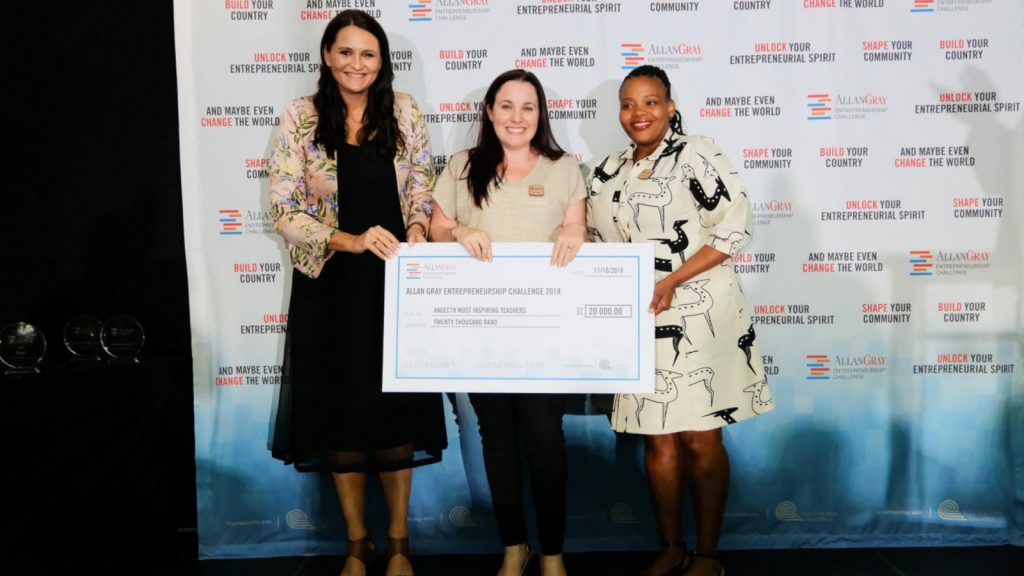South Africa’s esports scene is set for a major showdown as Hyprop and MTN introduce SHIFT COD, a Call of Duty tournament forming part…
Award-winning teacher calls for curriculum revamp to prepare learners for business world

African governments must improve the way commerce subjects are taught at school by making it more practical for learners — to better equip them for the world of business.
So, says Kirsty Tromp an accounting and business studies teacher and head of entrepreneurship at Cape Town’s Springfield Convent.
Tromp (pictured above, middle with Allan Gray’s Suzanne Wiid, left and Allan Gray, left and Allan Gray Orbis Foundation’s Zimkhitha Peter) is a recent recipients of Anzisha’s 2019 Very Young Supporters Award.
The other recipients are Ja Africa CEO Elizabeth Bintliff, Cape Town incubator RLabs and Africa Leadership Academy enterprise board member Naledi Rasekoala.
Tromp points out that schools on the continent place too large a focus on the traditional, Western model of success which encourages students to seek career paths in medicine, business and law.
She believes African governments need to look for African solutions.
Tromp won Anzisha’s 2019 Very Young Supporters Award
“We are a continent that has survived hundreds of years of droughts, floods, disease and we are still here.
“Our learners need to value their heritage and the skills that are being lost due to the focus that is placed on obtaining what the outside world sees as success,” explains Tromp.
She believes that traditional study is not the best path for many learners and young entrepreneurs.
“Entrepreneurship is the underlying skill to all professions and something that can be nurtured in the classroom and within schools through our commerce subjects.
Governments need to look at the school curriculum and allow for there to be a more practical component to the teaching of commerce subjects in order to inspire our learners to follow a different path, she argues.
Tromp is currently working on her schools 2020 syllabus for Grade 8 and 9 Economics and Management Sciences.
She says she’s planning on making the course work more practical in order to provide our learners with real world problems and experience while still remaining within the confines of the Curriculum and Assessment Policy Statement (CAPS) curriculum.
“Watch this space,” she says.
Strong entrepreneurship culture
Tromp previously taught at Durban Girls High School, where she says there was a “strong” entrepreneurship culture that formed part of every element of school life — from fundraising for the matric dance, to each class raising money for charity organisations.
“In 2017, our school embarked on the Allan Gray Entrepreneurship Challenge and this was my learners’ opportunity to put into practice the skills that they had learnt throughout their high school experience,” says Tromp.
With the help of mentorship, weekly lessons and chats in the school’s corridors, the learners were able to get placed in the top 20 schools nationally.
“This success led us to work harder in 2018 and form lessons at break and after school and we were placed in the top 10 schools, two of our learners were placed in the top 10, one of our learners were selected for the ‘Pitch campaign’ and I was placed first for most inspiring teacher,” she recalls.
Vital for youth to have role models
Tromp believes it’s vital for aspiring young entrepreneurs to have role models and mentors that they can turn to and established entrepreneurs should do so, by providing young people with mentorship opportunities.
“South Africa plays host to some of the most well-established businesses that were established by entrepreneurs, however, our learners in school can immediately name at least three American entrepreneurs when asked,” she says.
Tromp says established local entrepreneurs need to show the youth that there is opportunity in South Africa if one is willing to go out and work for it.
She points out that many learners are “slipping through the cracks” because of the pressure that is placed on them to fit into what society wants.
“From the perspective of a high school learner, the idea of not going to university and thereafter working in a conventional career path seems like failure,” she says.
Young entrepreneurs, she says, need to know that it is okay to follow their own path.
“They also need to know that it is ok to study further. They need the support and mentorship of their parents and teachers to be who they really are and to follow their own path in life,” she says.
‘Get involved’
Tromp urges established entrepreneurs and other professionals looking to support young entrepreneurs to get involved.
She further advised established entrepreneurs to form relationships with organisations such as Anzisha and the Allan Gray Orbis Foundation and to offer their time to them.
Tromp believes entrepreneurship runs in her blood. She says both her parents have had successful business ventures and have always worked for themselves.
Tromp says: “Entrepreneurship inspires learners to be problem solvers, to think outside of the box, to push their limits, to not conform to society. It inspires learners to be leaders who can think for themselves and to be self-reliant.”
This story appeared originally on the Anzisha Prize’s blog on 4 October. See it here.
Featured image, from left to right: Allan Gray Regional manager Suzanne Wiid, Springfield Convent accounting and business studies teacher and head of entrepreneurship Kirsty Tromp and Allan Gray Orbis Foundation head of programmes Zimkhitha Peter (Supplied)
The Anzisha Prize seeks to fundamentally and significantly increase the number of job generative entrepreneurs in Africa, and is a partnership between African Leadership Academy and Mastercard Foundation. Through Ventureburn, they hope to share inspirational and relatable stories of very young (15 to 22 year old) African entrepreneurs and the people that support them. [learn more]


